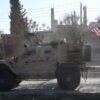Iran could now produce enough enriched uranium to arm a nuclear bomb within two to four months, according a new report by a Washington think tank.
The Institute for Science and International Security cautioned that Iran may still face “engineering challenges” in assembling a weapon and longer delays if it wants to test it and ensure its reliability. But it warned that Iran’s more than 10,000 centrifuges are steadily building a larger stockpile of low-enriched uranium that could be further enriched to arm a weapon.
Although Iran’s nuclear program appears to be in good health, its economy has deteriorated rapidly as international sanctions have exacerbated the impact of widespread economic mismanagement and corruption.
Iran’s people have voted with their wallets to acquire foreign currency to hedge against Iran’s high inflation and the plunging value of Iran’s currency, the rial, which lost about 40 percent of its value during the last week of September. The regime’s efforts to crackdown on currency speculators provoked a riot in Tehran last week.
President Mahmoud Ahmadinejad has blamed speculators, the United States, and international sanctions for the currency crisis. But many Iranians reportedly blame their own government for Iran’s weakening currency, soaring inflation, and high unemployment. Within the past year, estimates suggest that somewhere between 500,000 and 800,000 Iranian citizens have lost their jobs.
But it is difficult to turn Iran’s currency revolt into a genuine revolution against the regime. As bad as Iran’s economic situation has become, the regime is unlikely to bend until even heavier sanctions have been imposed. Iran’s nuclear clock is ticking faster than the country’s regime change clock.
Adam Gianella is currently a member of the Young Leaders Program at The Heritage Foundation. For more information on interning at Heritage, please visit http://www.heritage.org/about/departments/ylp.cfm.































One Reply to “Iran’s Enriched Uranium Stockpile Rises as Its Currency Plummets”